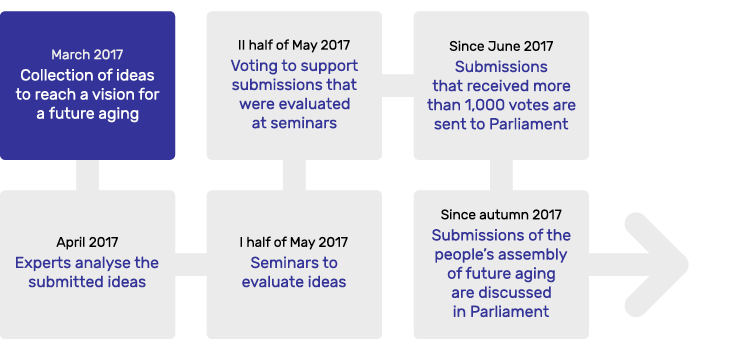Current situation
People hope that their income during retirement will be 70-90% of their salary. However, the national pension system cannot provide more than 35-40 percent in the future.
In Estonia among the population aged 65 and older 18% of people are actively employed. Their total average income exceeds 900 euros, while the pension of non-working people of the same age is 356 euros.
Less than 5% of people aged 55 years or older take part in lifetime learning. As people will need to work longer in the future, the labour market will change in the coming decades so much so that people’s skills, experiences and health won’t allow them to work until the planned age.
If the state increases the retirement age, a pension in today’s value will be similar to the current amount, which is about 400 euros. If the pension system doesn’t change, the old-age pension will decrease to 280 euros by 2050 from the figure of 360 euros in 2015.
The new old age in 2050 could look like this:
- The quality of life of an older person could depend on a person’s individual choices, not on the state;
- 60% of 70-year-olds could work full or part time;
- the share of people participating in lifelong learning could no longer depend on age;
- the income of non-working older people could be 70% of their previous income, while the share of the national pension could significantly decrease;
- frail old people could choose to live in a common house or community, care home or at home, because care expenses are covered;
- elderly people could have diverse skills; they could do different kinds of jobs and study at the same time;
- people could be informed about getting older, about what to expect and they could cope better.
The people´s assembly of future aging launching on 16th of March is looking for ideas on how people could work, learn and live as long and as happily as possible in the future. The people´s assembly concentrates on solutions that are required at a national level. The citizen assembly topics are:
- Insurance or how to provide a decent income for older people into the future?
- Self-realisation or how to ensure that people have the opportunity to learn and work until old age?
- Health or how to ensure that people will not leave the labour market due to health problems?
- Adaption or what is required to make the pension system changes simple and understandable for everyone?

Idea proposals can be made here: uuseakus.rahvaalgatus.ee
Appropriate offers supported by the public and giving strong impact will be sent to Parliament for discussion.
The people´s assembly of future aging is organised by Estonian Cooperation Assembly.
